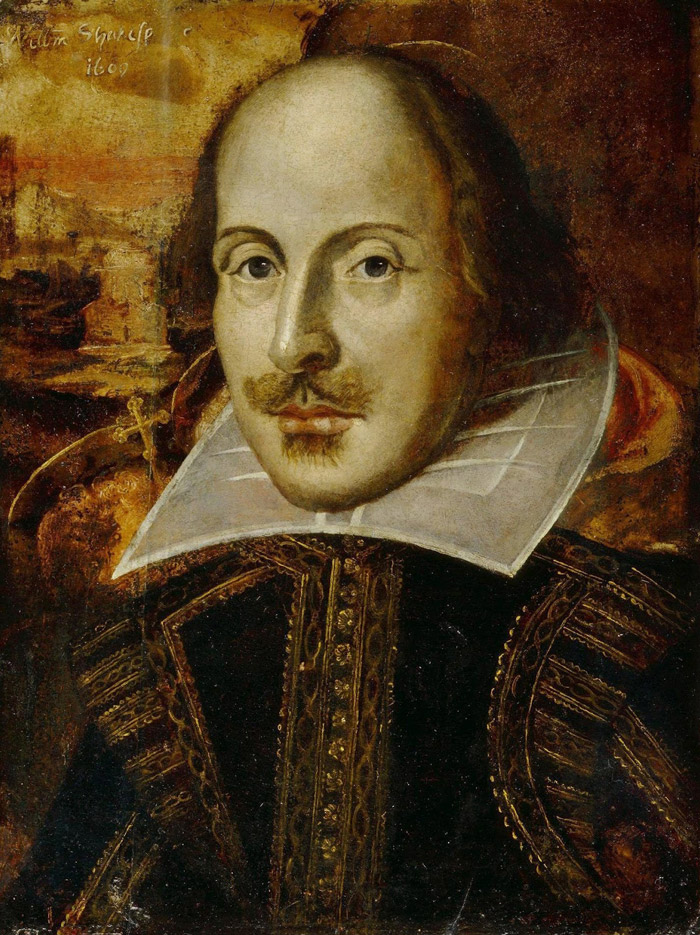Painting of William Shakespeare
Assignment #2
For assignment #2, select one of the questions below and write a 6 – 7 page paper. Remember to support your opinions by reference to the texts and be sure to quote passages from the literary texts.
For the take home final exam, you must answer one of the questions from this assignment sheet (other than the one you choose for assignment # 2!), and write a 5 - 6 page response.
1) Like Hamlet, Faust is one of the rare figures who have become genuinely mythical. Although Hamlet is a sensitive, delicate soul, he has a vigorous, ruthless side as a young man who has fought with pirates and sent Rosencrantz and Guildenstern to their deaths. Compare and contrast Faust and Hamlet.
2) Goethe's Gretchen in her madness recalls Ophelia. Discuss similarities and differences between these two characters.
3) Contrast Faust's encounter with the Earth Spirit in the “Night” scene with Hamlet's “this goodly frame the earth seems to me a sterile promontory” in Act II, scene ii, a famous speech of Hamlet's world-weariness, which may well have inspired Goethe. You may also compare this theme with Werther's letter of August 18 and his other correspondence, which laments how nature affects him as a monstrous power of destruction.
4) Compare and contrast the 3 young men – Fortinbras, Laertes, and Hamlet - who want to avenge their fathers' deaths. Why does Shakespeare end the play with Fortinbras as Hamlet's successor?
5) Discuss the character of Claudius. Does he have any endearing character traits?
6) Polonius’s murder starts the catastrophe in the play. Is Hamlet to blame for all the deaths at the end of the play? Explain. Why does Hamlet delay killing Claudius? What are his thoughts on revenge?
7) Describe Hamlet’s personality traits. Does he appear to be friendly and thoughtful, or arrogant and vengeful? Refer to specific instances. Do you feel sympathetic towards him? Why or why not?
8) Starting with Hamlet's advice to the players (III.2), discuss the art of acting on a stage with respect to action in the world of human affairs. How does the artifice of theater reveal truth?
9) How are women imagined and characterized in the poems you have read by Baudelaire? What attitude is implied? Is it dual or contradictory? Does Baudelaire give similar weight to the description of men? Compare the picture of women in Baudelaire and in Goethe’s Faust. What definitions of womanliness are depicted, affirmed, or criticized in each work?
10) In terms of symbolic voyages, compare Dante’s Divine Comedy to Baudelaire’s The Voyage and Rimbaud’s The Drunken Boat.
11) How does Verlaine’s work extend familiar Romantic themes? How is it different?
12) Compare the autobiographical voice in Rimbaud, Verlaine, and Baudelaire.
13) In his “Au Lecteur”, Charles Baudelaire reveals that the worst vice is not an evil initiative but moral passivity – ennui – variously translated as boredom or apathetic despair. Ennui is a destructive force, because it causes mental and physical paralysis that threatens an individual's essential purpose of life. The reader is invited to share the poet's experience, not through adulation of a lofty figure, nor through compassion, but as an alter ego. Is the narrator's denunciation of the personified figure of ennui, passively smoking a water pipe, an ironic dismissal of the poor reader?
14) The term “Bovaryism” was adopted by the French language a few years after the publication of Gustave Flaubert's novel in which the most memorable heroine of the 19th century defined herself and her personal experiences through common cliches. Bovaryism has come to signify a dream that is as banal and self-serving as the reality it purports to replace and is destined to diminish in the face of that reality. From the 19th century onward, Emma's name has become synonymous with “bored housewife syndrome”, adultery, and romantic delusions. Discuss the concept of ennui with regard to Emma Bovary's character.
15) According to Flaubert, he decided to chain himself to his desk writing a book about everything he hated most in the universe: the small-minded customs and impoverished language of middle class provincial life, the distorted legacies of Romanticism, the misguided appropriation of Enlightenment values with its unattainable ideals of historical progress, the blindness of the medical profession, the malignant impact of capitalism on the bourgeoisie, and the unseemliness of excessive feminine desire run out of control. The novel presents an array of characters who represent different professions and segments of society. Discuss several characters – pharmacists, doctors, clergymen, clerks, notaries, merchants, tax collectors – who embody various value systems, which Flaubert exposes.
16) Flaubert ran afoul of authority for his depiction of religion. Examine Flaubert’s strategy of not speaking in his own voice, but through the debates between Homais and the abbe Bournisien in the discussion of theater in Part 2 Chapter 14.
17) The death of Emma Bovary is among the most famous scenes in 19th century fiction. Discuss the kinds of details singled out by Flaubert and comment on the points he makes about the nature of the character who is dying. For a wider ranging examination of tone, look at some other death scenes (of Hector in the Iliad, for example, or of Aschenbach in Death in Venice). In each case, examine the values implicit in the author’s descriptive techniques and show how they guide the audience to make judgments about the deceased.


